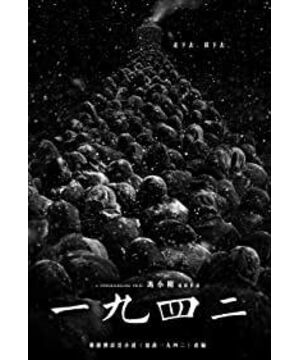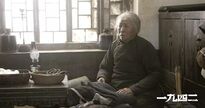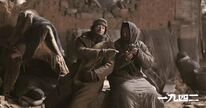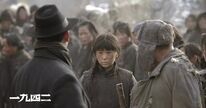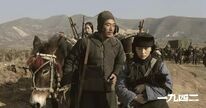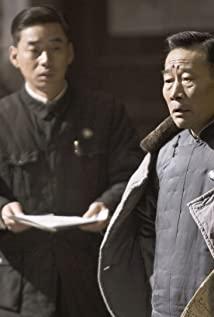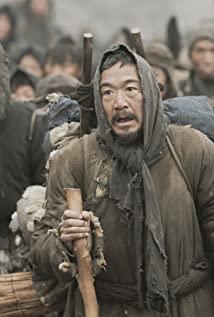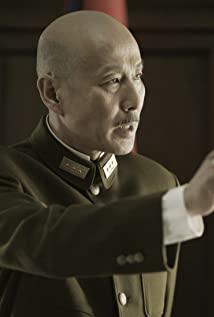member Yang (ie Yang Yifeng) told me on the phone on the afternoon of the 10th was: 1. Chongqing found out the report submitted by Li Peiji, chairman of Henan Province at the time, to the central government, saying that the grain harvest in Henan was good.
Why did Lee Peiji lie? Yang Quesu mentioned another person, Yu Zhenzhou, Secretary of the Henan Provincial Grain Administration Bureau and later the Henan Provincial Grain Administration Director:
Jiang Dingwen, the Chief of the First War Zone, Li Peiji, Chairman of the Henan Provincial Government, and Lu Yuwen, the Chief of Grain Administration. Henan Province military, political and food responsibilities. Henan was located at the forefront of the Anti-Japanese War, conscripting troops and collecting food, and it has been the top of the country. In 1942, when the second wheat was blooming, it was affected by the sudden change of weather, and it was beautiful and unreal. Although the wheat seedlings were very strong, there was no harvest. Centered on Fugou and Xuchang in Huangfan District, dozens of surrounding counties reported the disaster one after another. According to the actual report to the Central.
Chiang Kai-shek, worried about the issue of military rations, went to Xi'an in the autumn of 1942 to hold a military rations conference. Jiang Dingwen, the commander-in-chief of the Henan theater, reported the famine in Henan to Chiang Kai-shek, and was reprimanded. It was not until October 6, 1942 that the central government decided to send two high-ranking officials, Zhang Ji and Zhang Lisheng, to Henan to inspect and carry out relief, in order to declare "the virtues of the central government". On the 18th, Erzhang arrived in Luoyang, and more than 2,000 local representatives arrived at the station to welcome them. The victims also thought that the savior was coming and went there. On the 22nd, Luoyang Conference:
Zhang Lisheng spoke first, to the effect that although there were disasters in Henan, military rations could neither be avoided nor reduced. The task must be completed, and disasters should be rescued, but military rations cannot be reduced or exempted for disaster relief. Disaster relief and military rations are two The incidents should not be confused; at the same time, we should not exaggerate the famine and publicize it too much, so as not to affect the anti-war spirit and disturb the international audio-visual. (Zhang Zhonglu, Memories of the Henan Disaster in 1942, when Zhang Zhonglu was Director of the Construction Department of Henan Province)
The Mystery of Relief Funds
It may be irrelevant to discuss how cold the winter has been this year, but it is necessary to discuss how many people are suffering from severe starvation. According to Li Wenhai's description in "The Ten Great Famines in Modern China":
According to the survey, in the 72 counties in the Kuomintang area alone, there are more than 16 million people who are not self-sufficient, accounting for about 1/3 of the province's population, of which millions People get nothing. Even according to the conservative estimate of the National Government Yearbook, the number of people affected by the disaster is 11.46 million, of which about 2 million people do not survive.
After Er Zhang returned to Chongqing, the central government began to change its attitude towards disaster relief in Henan. It allocated 200 million yuan in banknotes as relief funds and ordered the authorities to reduce taxes. Banks in Chongqing transport bundles of banknotes on trucks to the disaster area. Unfortunately, at the time, what the victims needed was food, not these banknotes.
It is indeed hopeless to transport large quantities of grain from Central China to North China and Henan through broken and mountainous lines of communication. But outside the boundaries of Henan Province is Shaanxi Province, and Shaanxi has plenty of grain. In order to avoid disaster, a strong government should have ordered Shaanxi to immediately transport its grain to neighboring Henan. But forcing Shaanxi for Henan's sake would disrupt the delicate balance of power that the government considers indispensable. Grain can also be transported from Hubei to Henan, but the theater commander in Hubei does not allow it. (Bai Xiude, "Thunderbolt in China")
As early as the summer of 1942, great changes took place in prices across Henan. The average price of various grains in Zhengzhou doubled, from 40 yuan per city to more than 80 yuan. In Zhenping, a county close to the Huangfan District, in August, the price of wheat rose to 140 yuan, and that of rice was as high as 200 yuan. After the fall, grain prices in various places skyrocketed. The wheat in Luoyang was as high as 1,600 yuan, and the leaves were cheaper before the frost, but it also cost one yuan per liter. By December, the disaster victims in various places had cut off the idea of eating food.
So what is the role of 200 million fiat currency? According to the most conservative estimate of 10 yuan per catty and 200 million yuan of French currency, even if all of them are bought into grain, a maximum of 20 million catties can be purchased and distributed to 3 million victims, each of whom is only 6 catties, while the government collects 170 catties from farmers. Ten thousand bales of wheat, totaling 340 million catties. If these grains are distributed to 3 million victims, each person will receive more than 110 catties.
What's worse is that the relief funds arrived very slowly. Until Bai Xiude went to Henan for an interview in March 1943, only 80 million yuan of the 200 million yuan allocated to the provincial government. In the autumn of 1942, facing various pressures, Li Peiji had to admit the reality that no county would be free from disasters. The provincial government established a grain purchasing committee. Because Lu Dangping, director of the provincial education department, had personal friendships with Shaanxi chairman Xiong Bin and Hu Zongnan, he decided to go to Xi'an to buy grain. Xi'an cut the price of grain by 2 yuan, sold it to the Grain Purchasing Committee at 6 yuan per catty, and asked the Ministry of Communications to order Longhai Director Lu Futing to give priority to supplying the disaster relief food in Henan trains. However, the grain-buying officials used the grain money to sell smuggled goods. It was not until 1943, when the new wheat was ripe, that the first batch of grain relief was shipped to Luoyang. This huge corruption and fraud case was later disclosed by Utusan.
A great report
as early as in its editorial in July 1942, Utusan once pointed out, "If the government sits idly by and leaves it as wasteful as before, then if it doesn't rain for ten days, half of Henan will be left alone. Even if they were tossed around the line of starvation, starved to death, or displaced, there would be no one who would cooperate with the enemy to fight the enemy in the northern battlefield. The matter is very serious, and the feelings are also very pressing.
On January 17, 1943, the "Ta Kung Pao" field reporter Zhang Gaofeng sent a newsletter "Hungry Henan" from the headquarters of Yexian and Tang Enbo. On February 1, Ta Kung Pao published it as "Records of the Henan Disaster". Years later, Zhang Gaofeng still thinks his title is more impactful.
The original barter era has been restored in Henan. No one wants to sell their children. Their young wives or 15- or 16-year-old daughters are all carried on donkeys to sell as prostitutes in the markets of Tuohe, Zhoujiakou, and Jieshou in eastern Henan. Selling a mouthful of people can't buy four buckets of food...
The next day, February 2, was the twenty-eighth day of the twelfth lunar month. People in Chongqing were busy celebrating the Spring Festival. The Ta Kung Pao article made Chiang Kai-shek angry and readers The shocking editorial "Look at Chongqing, read the Central Plains" was published in the newspaper:
Seeing Chongqing, reading the Central Plains, it is really emotional! The government may be lenient to Chongqing to the end; but we Chongqing people must deeply introspect, and don’t be too greedy for material things. When this feasting department store is ready for the Chinese New Year, we should restrain our desire to drink and eat, and save money for gifts to move Relief victims in Henan. In this way, our sins can be relieved a little, and our conscience can be comforted a little!
Chiang Kai-shek immediately ordered Ta Kung Pao to suspend publication for three days. "Times" reporter Bai Xiude and The Times reporter Herrison Foreman decided to go to Henan to interview. In early February 1942, they took a hand-cranked patrol car to Luoyang. Then I took a truck and rode to Zhengzhou again. The day before the two reporters arrived in Zhengzhou, it snowed heavily. On the way, their horses almost stepped on a few fugitives who had slept in the snow.
At dawn the next day, the huge Zhengzhou city that appeared in front of Bai Xiude looked like a white wasteland ruled by the god of death. The city originally had 120,000 residents, but it was invaded and destroyed by the Japanese army and besieged by famine. Now the city is less than 40,000 people. On March 22, Time magazine presented the famine to American readers with the title "Waiting for the Harvest".
No one knows and cares how many refugees die on this road. Two million people are said to have fled along the road since the fall. There are still 10,000 people flocking west from here every day. Of the 34 million people in Henan, we estimate that 3 million have become refugees. In addition, 5 million people will die before the fall harvest season.
At this time, Song Meiling was speaking all over the United States, and Bai Xiude's report made her annoyed and ashamed. She even asked her boss, Henry Luce, to fire Bethel, but Luce refused. Bai Xiude then met Chiang Kai-shek with the help of Soong Ching Ling.
When I told the commander-in-chief about dogs eating people and he denies it, Foreman, who was in the front room, got pissed and was called in. His photos clearly show dogs digging up dead bodies by the side of the road. The commander-in-chief's leg started to shake a little...he thanked us and said I was a better investigator than all the investigators he personally sent.
Soon, Bai Xiude received a letter from Father Megan in Luoyang. Megan revealed that after the farewell, grain was urgently transported from Shaanxi along the railway line, and the army also took out part of the surplus grain. The whole country is busy collecting donations for the disaster area, and money is pouring in from all directions in Henan. Megan told Bai Xiude: After you went back and sent the telegram, several trains of grain suddenly arrived from Shaanxi. In Luoyang, it was too late for them to unload the food quickly. This is a first-class result... The provincial government got busy and set up porridge stations all over the country. They are really working and doing something. The army took out a portion of the large surplus of food, which also helped a lot. The whole country is indeed busy collecting donations for the victims of the disaster, and the cash is being sent to Henan continuously... Your visit and your rebuke to them have achieved the expected purpose, making them wake up and begin to perform their duties... In Henan, the common people will always You take it to heart.
View more about Back to 1942 reviews


